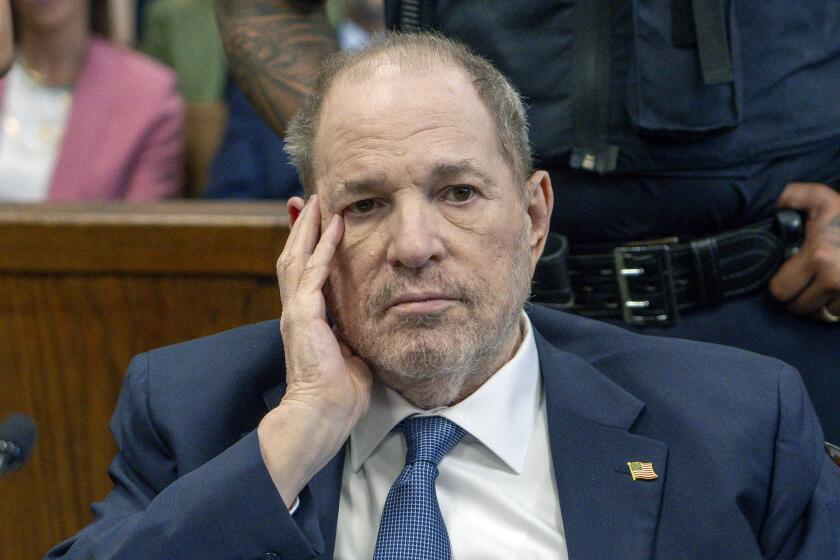NEWS ANALYSIS : Soviets Try to Repair Communism, Won’t Give It Bum’s Rush : Kremlin: Unlike its former satellites, the nation cannot completely dump the foundation on which its structure has been built.
In Poland, Hungary and Bulgaria, it was Communist Party leaders, not disgruntled dissidents, who kicked out the Stalinist supports of their power, undermining the ruling monopolies and triggering the collapse of communism throughout Eastern Europe.
But the biggest of Communist dominoes shows no sign that it is ready to fall.
The ideology is in crisis in the Soviet Union for failing to deliver on a century-old promise of a workers’ paradise, but the descendants of the revolutionaries who transformed Karl Marx’s theories into governing practice have neither the desire nor the ability to throw out the Communist Party.
The future of Soviet communism is at stake at the 28th Communist Party Congress, where political leaders are battling to redraft the ideological charts that have guided them out of dictatorship and into disaster.
High-level hand-wringing over how to extricate the nation from an economic morass of the party’s making will likely prompt the congress to make course corrections that traditional Marxists might consider a betrayal of the Communist cause. But the power brokers of the world’s first socialist state are talking about repairs, not the wholesale replacement of their system.
Communism cannot be given the bum’s rush from the Soviet Union, as happened in Eastern Europe last year, because it created the moral, economic and political foundation on which the national structure sheltering 290 million Soviet citizens has been built.
Jobs, homes, medical care, schooling, transport, industry, even movies and books--all are the products of the Communist Party’s managers, planners, engineers, ideologists and intellectuals driven by the goal of creating a Utopian world.
Unlike in Eastern Europe, where revolution rolled in with Red Army tanks, communism--at least in 1917--was the deliberate choice of a majority of the Russian people.
“Marxism was accepted and developed by Russia. A synthesis of social and historical circumstances made the Russia of 1917 a propitious soil for Marxist revolutionary ferment,” said Ivan I. Antonovich, a social scientist on the staff of the party’s policy-making Central Committee. “This fact can’t be ignored, no matter what came later.”
Soviet dictator Josef Stalin imposed the ideology on Eastern Europe after the 1945 Yalta Conference among the World War II Allies deeded control over the vanquished region to the Soviet Union.
Czechoslovakia had been a prosperous democracy, and rich agricultural traditions in Poland and Hungary lived in the memories of the repressed peoples through four decades of Soviet domination that never succeeded in convincing Eastern Europeans of communism’s appeal.
Neither did communism win hearts and minds in the Baltic nations of Estonia, Latvia and Lithuania, which Stalin had taken over in an earlier deal with Nazi Germany. Today, as a result, Soviet communism faces its greatest challenge from this region as each nation seeks to secede.
President Mikhail S. Gorbachev gave the fraternal nations of socialism the weapons for peaceful liberation when he wrote into his perestroika reform script the right of each state to self-determination.
Polish Communists caved in to pressure to legalize the Solidarity trade union. Hungary opened a hole in the Iron Curtain by tearing down barbed-wire fences that had locked its people into Moscow’s unwelcome alliance. East Germans poured through the new opening, bringing down the government in East Berlin. And Czechoslovaks, Romanians and Bulgarians followed suit by ousting hard-line leaders.
But Soviets have 73 years of history to justify, not an occupation force to overcome.
“The thought that there will be a collapse of socialism here is only wishful thinking or a misreading of the developments,” observed Michael Davidow, an American Communist who has spent 12 years in Moscow as a journalist for the People’s Daily World, the U.S. party newspaper.
“The Soviet Union is not Poland, it is not Czechoslovakia or the GDR (East Germany),” he said. “It led the revolution” for socialist government.
A leading Soviet economist, Oleg T. Bogomolov, has warned that what worked for the small nations of Eastern Europe in the way of reform does not necessarily apply to a superpower where every accomplishment has been the result, or fault, of socialist planning.
In an interview on the consequences of Eastern Europe’s break from the Kremlin orbit, Bogomolov told the weekly Literary Gazette that changing the socialist system that permeates every aspect of Soviet life is a colossal task to be undertaken in carefully measured doses.
“A milligram of explosive is one thing, a ton of TNT that could destroy everything around is quite another,” warned Bogomolov, one of Gorbachev’s closest advisers on the economy and foreign relations.
The current congress, which is seeking to retune the ideological machinery, has been confronted by a small group of radicals demanding sweeping changes like those employed by East European Communists to dismantle their dictatorships from the top.
But the Democratic Platform, a left-wing faction within the party pressing for the Communists’ divestiture of power, is promoted by only about 5% of the almost 4,700 delegates, and new rifts have formed even within those meager ranks.
The Soviet Communist Party’s best protection against ouster is probably the absence of an alternative force capable of running what remains a superpower and the world’s second-largest economy.
Fledgling political parties were merged in Hungary, Czechoslovakia, East Germany and Poland from the dissident and pro-independence groups that operated for years on the outskirts of political tolerance. In elections over the past year, voters in all these countries have chosen governments in which non-Communists are the dominant element.
In Bulgaria, the Soviet Union’s closest remaining ally, opposition groups were unable to convince voters in an election last spring that the Communists should be replaced. Romanians, in a popular uprising, overthrew the Communist dictatorship and dissolved the Communist Party, but then in May, elected a government made up of former party leaders.
Unofficial groups have formed throughout the Soviet Union to champion such various causes as environmental protection, women’s issues, political pluralism and the rights of veterans. But a unified political party with the structure and breadth to govern a nation has not yet developed to challenge the Communist monolith.
Conservatives from the provincial regions that have suffered the most from a chronic dearth of food, goods and services have been the loudest voices at the congress against turning away from the socialist cause.
Georgy Bukharov, a miner who addressed fellow Communists this week with an impassioned plea for reason and restraint, criticized the party for putting up with renegade members working to undo the history of the Soviet Union.
More to Read
Start your day right
Sign up for Essential California for news, features and recommendations from the L.A. Times and beyond in your inbox six days a week.
You may occasionally receive promotional content from the Los Angeles Times.





